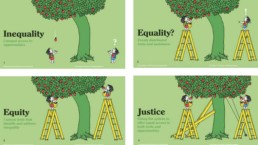DEI
Our Commitment to Diversity, Equity, and Inclusion
The Susquehanna Waldorf School actively encourages its students to understand, respect, and appreciate diversity as defined by a range of racial identifications, ancestries, nationalities, native languages, socioeconomic backgrounds, family structures, ages, belief systems, gender, sexual identities, abilities, appearances, and occupations. We are dedicated to the ongoing process of furthering diversity in our student body, faculty, staff, administration, and trustees. Our commitment to diversity, equity, inclusion, and social justice is reflected in both our curriculum and in our community strivings, as we seek to ever deepen our empathy for one another and the world in which we live.
Susquehanna Waldorf School formed a Diversity, Equity and Inclusion committee in 2020 that meets bi-weekly to ensure we are accountable to our DEI commitment. In the 21-22 school year, the Lancaster YWCA facilitated four trainings for our faculty and staff on the topics of racial and gender equity. In the 22-23 school year, Alma Partners facilitated two workshops for faculty and staff on creating more diverse and inclusive curriculum. Also in the 22-23 school year, the Rainbow Rose Center facilitated a training on “LGBTQIA+ Education: Youth, Transitioning, and Allyship.”
AWSNA’s Statement of Equity and Racial Justice
The Association of Waldorf Schools of North America (AWSNA) recognizes the historic and ongoing impact of racism on our continent and the injustice and discrimination faced by Black, Brown, Indigenous and People of Color. We understand that racial justice in education is a journey of both moral and educational imperative. As such, we take seriously our responsibility to bear witness to what is happening in the world, to center the voices of color in justice work, and to change the course of inequities by identifying and breaking down structural racism in all forms within Waldorf education.
We acknowledge that Rudolf Steiner, founder of Waldorf education (1919), offered many profound insights that support the value and dignity of each human being and form the foundation of our organization’s histories and worldview. Yet, he also made statements that reflect harmful assertions regarding race and ethnicity. Racism, explicit or implicit, stands in direct conflict to the fundamental principles of Waldorf education. We commit to working to address any dehumanizing or disparaging aspects of our history and practices.
Advancing diversity, equity and inclusion (DEI) is one of the compelling forces behind AWSNA’s strategic priorities. These priorities are central to our work and aim to bring us closer to the world that we want for our youth.

